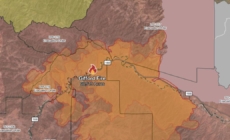-
Red Sox’ Shocking Offer Revealed For Twins’ Joe Ryan At Trade Deadline - 20 mins ago
-
Yankees vs. Marlins Highlights | MLB on FOX - 35 mins ago
-
L.A. teachers demand LAUSD provide more protection for immigrants - 46 mins ago
-
Yankees Predicted To Sever Ties With Fan Favorite Pitcher Following Trade Deadline Moves - 59 mins ago
-
Tigers vs. Phillies Highlights | MLB on FOX - about 1 hour ago
-
Gifford fire burns 30,000 acres in Los Padres National Forest - about 1 hour ago
-
Jerry Jones Rejects Cowboys Star’s Shocking Request - 2 hours ago
-
MLB Speedway Classic at Bristol Motor Speedway Suspended, Resuming Sunday - 2 hours ago
-
Small Earthquake Rattles NYC and New Jersey Saturday Night - 2 hours ago
-
Lionel Messi Exits Inter Miami’s League Cup With Apparent Leg Injury - 3 hours ago
Iran Reacts to New US ‘Assault’
The Iranian government has vehemently condemned a new round of sanctions by the United States that targeted over 115 individuals, entities and vessels linked to its oil and petrochemical sectors, calling the measures a continuation of Washington’s “hostile policy” and an “assault on the Iranian people.”
The sanctions, announced on Wednesday by the U.S. State Department, represent the latest step in America’s “maximum pressure” campaign aimed at crippling Tehran’s energy revenue, with the move promoting swift denunciation from Tehran as unjust and provocative.
Newsweek has contacted the U.S. State Department and Iran’s Foreign Ministry for comment.
Why It Matters
The sanctions marked the most sweeping U.S. economic action against Iran’s energy sector since the Trump administration exited the nuclear deal in 2018, and they followed a major escalation in regional conflict. In June, the U.S. joined Israel in launching coordinated strikes on Iranian targets, significantly disrupting Tehran’s nuclear infrastructure.
With diplomacy stalled and Iran expanding ties with Russia and China, the sanctions are designed to cripple the financial networks fueling Iran’s economy and by extension its power and influence over proxy groups in the region.
Possible implications of the move include the further destabilization of global energy markets and a deepening of East–West geopolitical divides.
Atta Kenare/Getty Images
What To Know
Iranian authorities on Thursday accused the United States of intensifying economic aggression. Its Foreign Ministry spokesperson Esmail Baqaei said the decision was “clear evidence of the hostility of American decision-makers towards the Iranian people,” insisting that Iranians would resist the pressure with resolve.
He said the sanctions were designed to “weaken Iran and violate the fundamental rights of every Iranian.”
Baqaei also accused the Trump administration of suffering from a “chronic addiction to unilateralism” and relying on “pressure tactics in pursuit of illegitimate goals,” rhetoric that signals increasing frustration in Tehran as economic and diplomatic tensions mount.
Largest U.S. Sanctions Package
The new U.S. sanctions are the largest Iran-related measures since 2018, targeting over 115 individuals, entities and vessels linked to the country’s petroleum sector.
The package focuses on a global shipping network allegedly controlled by Mohammad Hossein Shamkhani, son of a senior adviser to Supreme Leader Ali Khamenei. It designated 20 oil firms, five vessel management companies, one wholesaler, and dozens of actors across 17 countries and regions, including the U.K., Italy, Switzerland, India, the UAE and Hong Kong.
The U.S. government said the network laundered billions of dollars in oil and petrochemical revenue, mainly through covert shipments to China. Using foreign passports, shell companies and deceptive maritime tactics, it helped Tehran skirt sanctions. Washington frozen their U.S.-linked assets and blocked access to the American financial system, according to the announcement.
What People Are Saying
Iranian Foreign Ministry spokesperson Esmail Baqaei: “The Iranian people, aware of the malicious intentions of these aggressor sanctions—whose only purpose is to weaken Iran and violate the fundamental rights of every Iranian—will stand firm with all their might to protect their dignity and interests.”

Getty Images
U.S. State Department spokesperson Tammy Bruce: “Today’s Department of State action is being taken pursuant to Executive Order (E.O.) 13846, which targets Iran’s petroleum and petrochemical sectors. It marks the eleventh round of sanctions targeting Iranian oil sales since the President issued National Security Presidential Memorandum 2 on February 4, 2025, ordering a campaign of maximum pressure on Iran.”
What Happens Next
With nuclear diplomacy stalled and U.S. strikes on Iran’s nuclear sites still reverberating, the new oil sanctions aim to choke off one of Tehran’s most critical revenue streams. By targeting the shipping and export infrastructure behind Iran’s petroleum trade, the U.S. is escalating economic pressure at a moment of heightened regional instability.
The move threatens to harden Iran’s stance, deepen the standoff between Tehran and Washington, and further diminish any realistic prospects for a diplomatic solution.
Source link






























